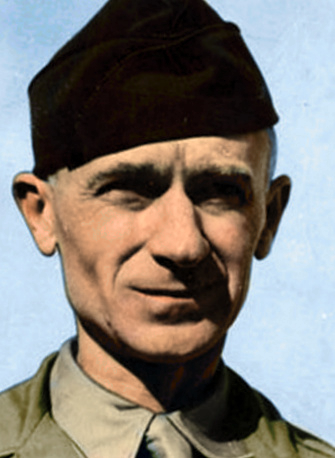The Pittsburgh Press (February 20, 1945)

Roving Reporter
By Ernie Pyle
IN THE MARIANA ISLANDS (Delayed) – Our chief pilot on the last long leg of our flight from Honolulu to the Marianas was Lt. Cmdr. Don Skirvin. He’s from the family that owns big hotels in Oklahoma City and even if you didn’t know, you could tell from his creased hands and neck that he’s either a Texan or an Oklahoman.
Cmdr. Skirvin has never worked at the hotel business, though. He has to have freedom, and gad about the world. He has been flying 18 years – flew for oil companies in South America, went to Spain during the revolution and flew combat there.
Then came our war and he went into the Navy and flew combat in the South Pacific. But he likes big planes best, and now is trans-Pacific skipper on these huge airliners.
Just before daylight Cmdr. Skirvin sent the orderly back to wake me up, and asked me to come forward to the pilot’s compartment. Then he had me sit in the co-pilot’s seat, and from that exalted vantage point on this monster of the air I saw the dawn gradually touch and lighten the cottony acres of clouds out there over the wide Pacific.
Little peaks of grandeur
Flying is mostly monotonous and dull. But there are always little peaks of grandeur in every flight. Seeing this dawn come was one of them. It was an exaltation, and you couldn’t help but be thrilled by it.
Cmdr. Skirvin takes movies as a hobby, and has taken 1,500 feet of color film of just such dawns and sunsets as this one. He said the folks at home wrote that if he saw such things as this often, no wonder he liked to fly.
We came out of the boundless sky and over our island destination just a little after dawn. The island was green and beautiful – and terribly far from home – down there in the fresh dawn.
Do it all the time
It seemed unbelievable that we could have drawn ourselves to it so unerringly out of the vast Pacific spaces. It was like a blind man walking alone across a field, and putting his finger directly on some previously designated barb of a wire fence on the other side. But as I say, they do it all the time. (Thank the Lord!)
Then Cmdr. Skirvin asked me if I would like to stay up front while we landed. Indeed I would, for that is a rare invitation. I stood just behind the two pilots while we circled the field and dropped lower and circled again.
Landing one of these immense planes is like a ritual in school. The co-pilot takes a printed list, encased in plexiglass, from off the instrument board. Then he starts reading aloud, down the list. After each item the pilot calls back “Check.”
Thorough check
It takes five minutes to go through all the complicated adjustments to change the plane from something that will only fly, into something that will also merge successfully with the earth. Always the typed list is read aloud and checked to make sure that no single thing is forgotten.
And then we were ready. It was hot down close to the ground, and sweat was pouring off us. Over his radio the co-pilot asked the ground for permission to land. Cmdr. Skirvin twisted himself more firmly into his seat, took a heavy grip on the control wheel, pushed forward on the stick, and down we went.
When you fly, there is no sense of speed at all. It is as though you were sitting forever in one spot. But when you land, the earth comes up to you with appalling speed. Things go faster and faster. Everybody is tense. The whole field comes up at you almost as in a nightmare. It is the most thrilling thing about flying.
Landed at last
And then you blend into the earth. These planes are so big and stand so high that it seemed to me we were still 50 feet in the air when we felt the wheels touch. The plane stuck to the runway and rushed on forward with shocking speed.
The runway was long, and Cmdr. Skirvin called, “We’ll use all of it, for I don’t believe in tromping on the brakes.”
Then gradually we slowed and when we’d come almost to a stop, a jeep pulled out in front of us. On the back of it was a big blackboard and painted on the board were the words “Follow Me.” The jeep slowly led us to our parking place.
Then the co-pilot read off another list, while the pilot pulled levers and turned switches and called “Check.” It took more than a minute to transform that great metal bird from something animate and miraculous into something that stands lifeless on the ground.
And then the door opened and we stepped down onto the strange soil of the Mariana Islands – close at last to the vast sprawling war of the Pacific.